A sharing operation consists of players with different interests. Rules that ensure smooth interaction between drivers and operators, and fees that are charged when rules are violated are helpful. These influence the behavior of your drivers, for example when it comes to paying bills, thinking ahead when making bookings and cancellations, or returning vehicles on time. In the MOQO fee catalog, sharing providers can set rules and assign fees to misconduct. The fees are billed digitally and automatically. This article explains everything about the fee catalog.
Why Fees?
Fees promote a smooth flow in sharing operations. For example, they can enable a fluid handover of vehicles among drivers, with the preceding driver showing up on time and with the vehicle loaded. Ultimately, fees benefit not only you as the operator, but also your drivers.
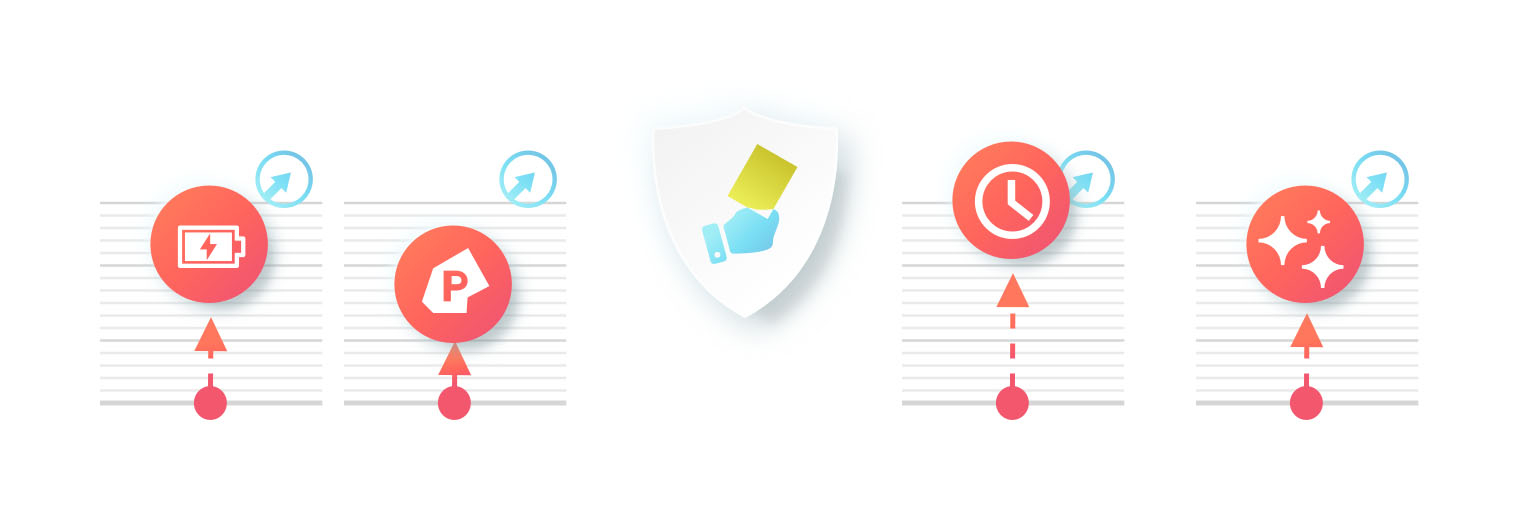
Strengthen well-organised Vehicle Use
First, fees serve as a deterrent. Experience shows that offenses are not committed in the first place if they are listed in the fee catalog.
Example: The fee catalog states that smoking is not permitted in the vehicles of provider Fly Share. A violation of this rule is penalized with a fee of 20 €. The driver reads this in the fee catalog and will therefore prefer not to smoke in the vehicle.
Expense Allowance
The fees can cover those costs that arise due to non-compliance with rules, for example because the preceding driver does not return the vehicle on time, the following driver therefore looks for an alternative mobility offer and you as the provider have to forego revenue as a result. In order for the fees to cover these costs, the fee should be at least as high as the costs incurred by the sharing provider. The same applies if the fees are intended to recover expenses for services rendered. If the sharing provider has to get the vehicle cleaned due to its cleanliness state, these costs can be passed on to the driver. Thus, in order for the fee to cover the costs, the fee must be at least as high as the cleaning fee.
Example 1: A driver forces the vehicle return and does not park the vehicle at the predefined return location. The sharing provider then has to move the vehicle to the parking lot so that it is available for the following booking. The costs incurred due to the additional effort are charged to driver A manually.
Example 2: Because the account of a driver is not not funded enough, the payment of his booking fails. As a result, a fee of €7.50 is automatically charged by the payment provider and invoiced to the sharing provider. So that the sharing provider does not have to bear these costs, the fees are passed on to the driver. Therefore, failed payments are priced at €7.50 in the fee catalog by default.
Learning Effect
Last but not least, fees also have an educational function. They are intended to ensure that drivers learn from their mistakes and therefore do not repeat rule violations.
By taking steps to educate individual drivers, the entire user group benefits and enables an ideal booking experience.
Via the display of the fee catalog in the app, applicable rules of the sharing provider and linked fees are communicated transparently. Consent to the fee catalog is integrated into the creation of a booking, making them legally effective.
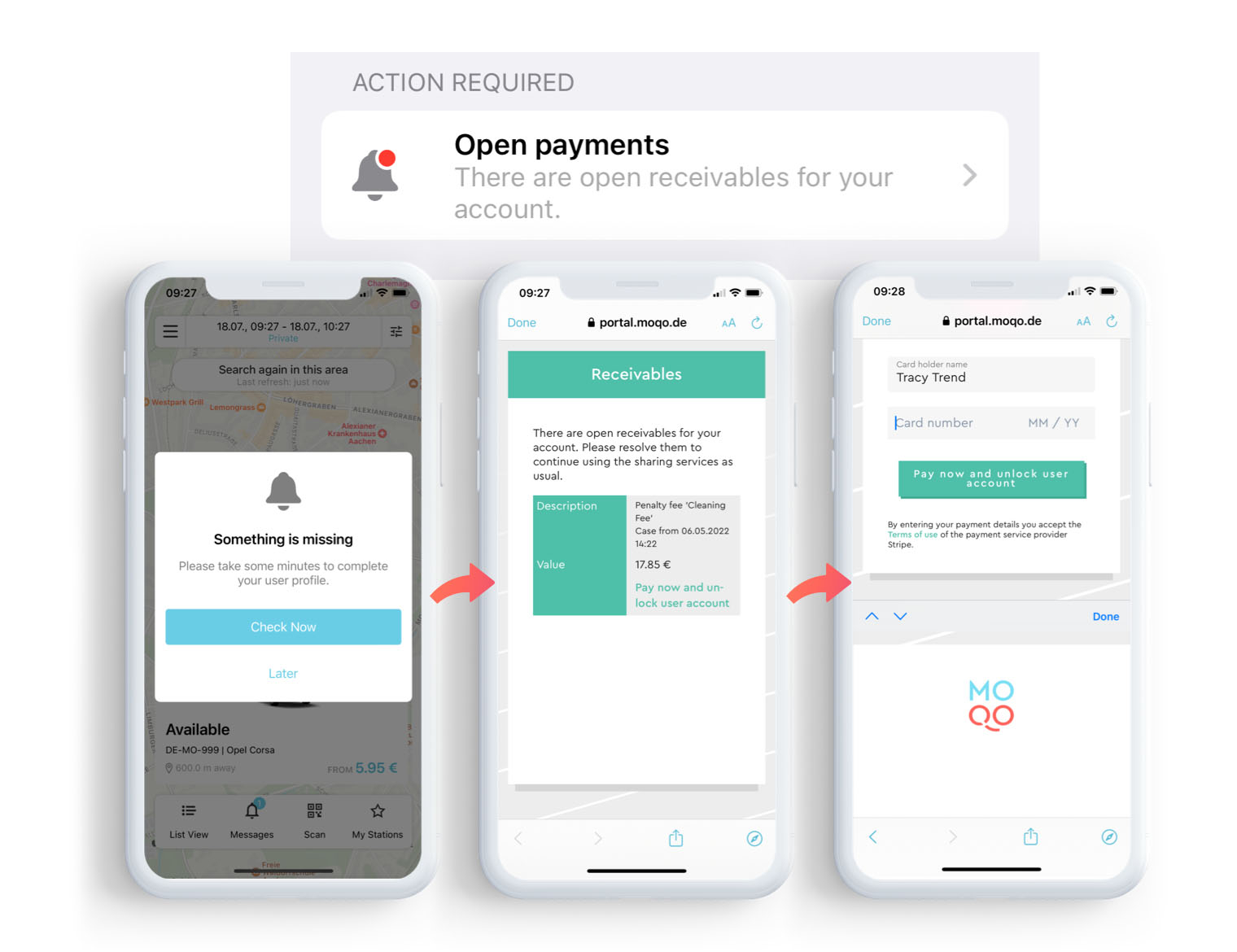
What Is the Fee Catalog?
Because of the above benefits of fees, fee catalogs are a common principle in the shared mobility space. A fee catalog sets rules that drivers must follow and determines what happens when drivers do not follow them.
With the MOQO fee catalog, sharing providers can digitally impose and settle fees in case of their violation.
Where Can I find the Fee Catalog?
The fee catalog is managed by sharing providers via the MOQO portal. There, fees can be activated, deactivated, adjusted and newly created.
To inform drivers about the applicable rules, the fee catalog is displayed to them in the app before and during the booking of the vehicle.
For more information on creating and charging fees, sharing providers can refer to the MOQO Academy.
When Should I Use the Fee Catalog?
The use of the fee catalog is beneficial and recommended regardless of the fleet size and the types of vehicles offered.
The Fees
There are two types of fees that can be managed in the catalog: Preconfigured and Individual fees. Preconfigured fees are already stored in the MOQO portal and are only activated by sharing providers. The fees are charged automatically. Individual fees are user-defined by sharing providers (with a Pro Package minimum) and collected manually on a case-by-case basis.
Charge automatically with preconfigured fees
The preconfigured fees represent common violations in the shared mobility space. These include failed payments, cancelled bookings, and late returns. These fees are already stored in the MOQO portal where they can be activated, deactivated and reactivated as desired. Only the "payment failed" fee cannot be deactivated. The pre-configured fees are automatically charged in case of a rule violation - i.e. a failed payment, a cancelled booking or a late return. This automation means there is no additional effort for the sharing provider.
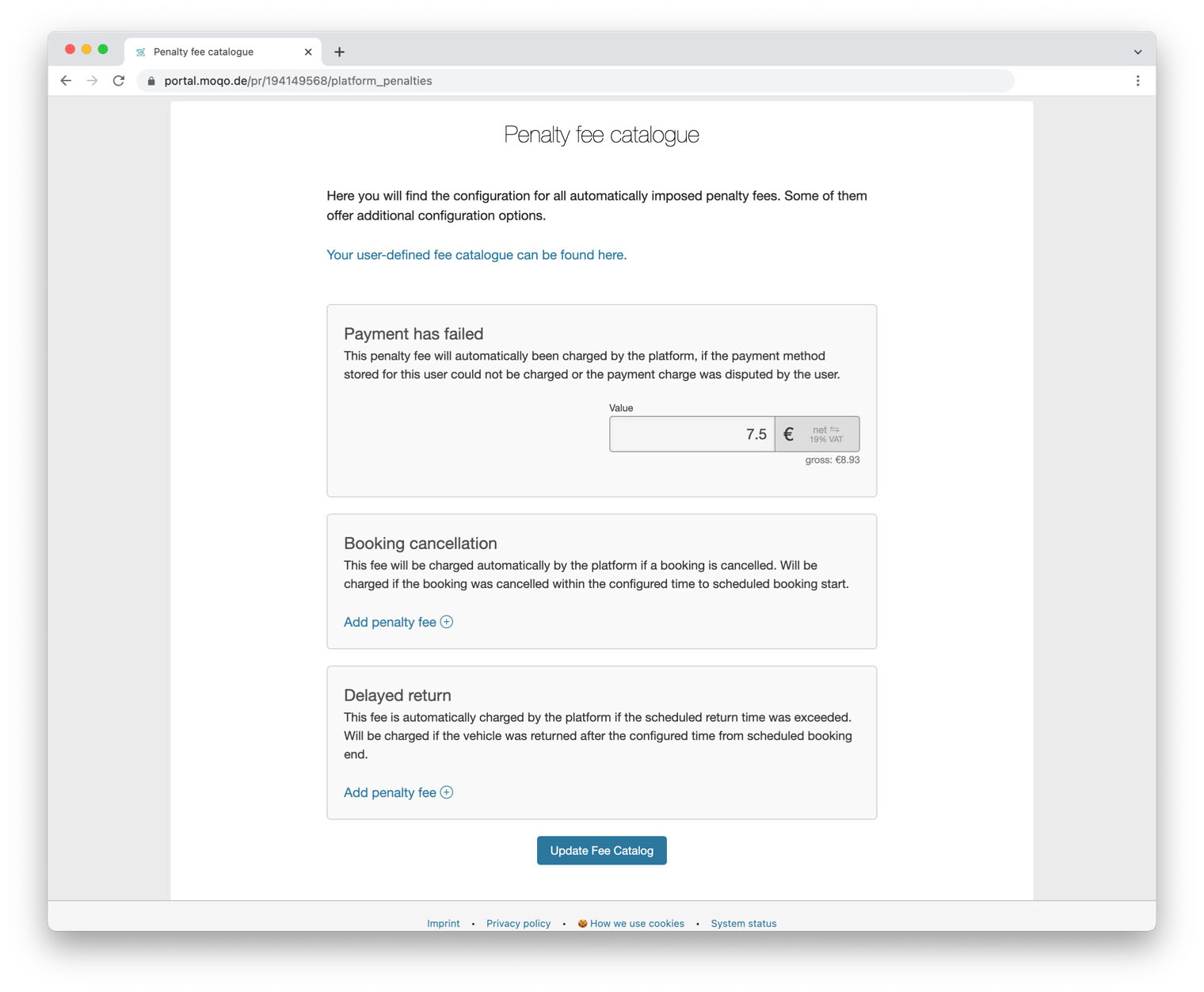
Payment failed
The "Payment Failed" fee kicks in when there are insufficient funds in the driver’s account, when payments are revoked or declined. They are charged to the rider immediately after the payment has failed. A failed payment is already priced at €7.50 by default in the MOQO portal. This is the fee that payment providers charge in case of a failed payment and bill in to the sharing provider. Although the fee of €7.50 can be reduced in the portal, in that case costs would be incurred by the sharing provider. With the fee of 7.50 € already set, the costs incurred are passed on 1:1 to the driver.
In the case of a failed payment, it is also not recommended to increase this estimated fee. This is because: in principle, fees have an "educational effect" and are intended to prevent the same rule violations from being committed several times by the same driver. However, since failed payments are usually not intended, this effect does not exist.
Booking Cancelled (At Short Notice)
The "booking cancelled" fee is charged when drivers cancel the booking from a certain point in time, usually at very short notice before the booking starts. Sharing providers have the freedom to stagger fees here: the shorter the cancellation notice, the higher the fee.
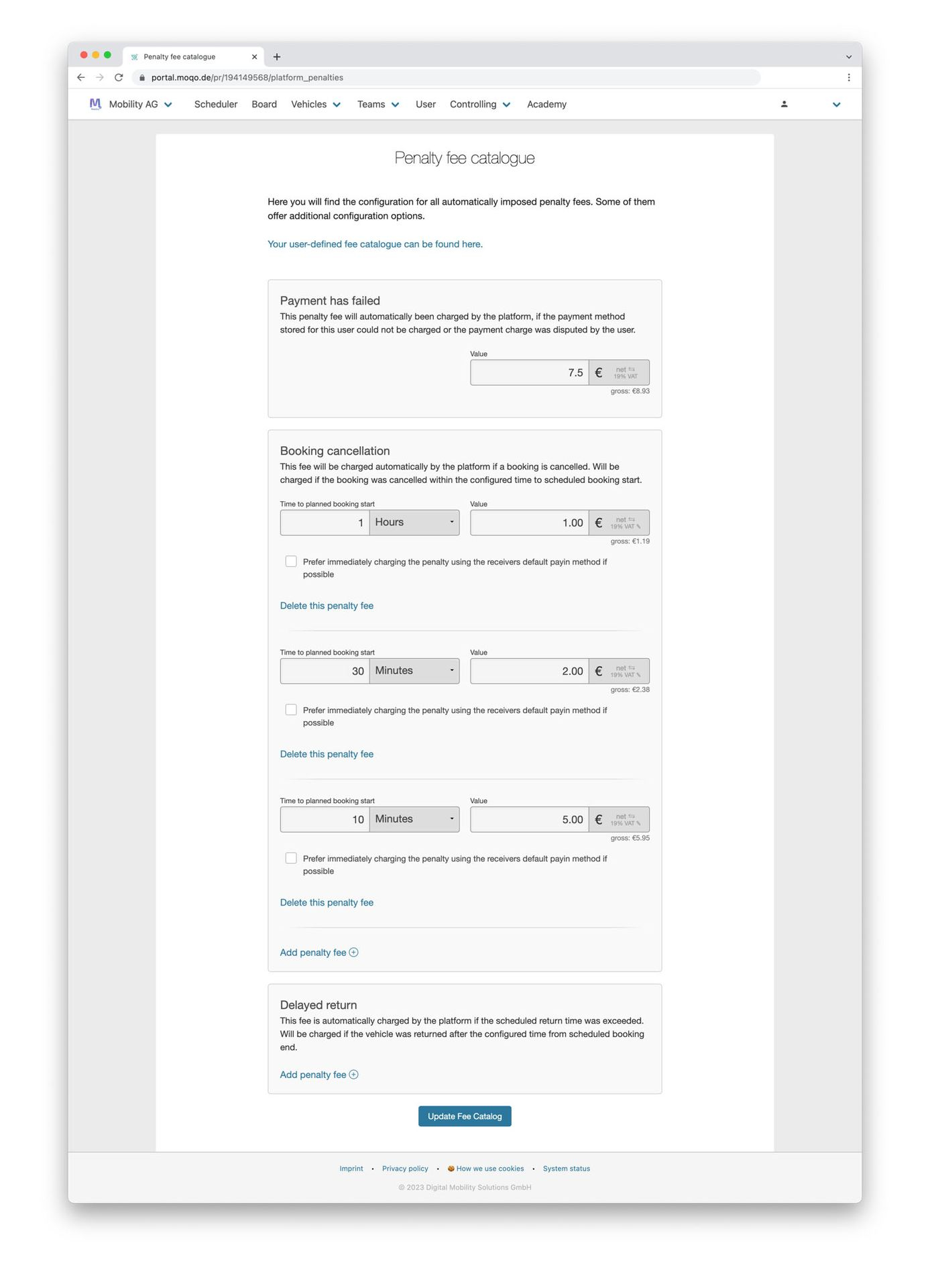
This fee is intended to ensure that drivers behave fairly, do not create bookings on suspicion and thus block the vehicle for other potential drivers to cancel the trip at short notice.
Example: Driver A would have liked to book a ride with a vehicle from provider Share Fly. However, the vehicle is no longer available for the desired time because driver B has already booked a ride. Driver A looks for an alternative. Driver B changes his mind and cancels at short notice. In this case, neither driver A nor driver B completes the trip and sharing provider Fly Share loses revenue.
By imposing the fee, the behavior of driver B is simultaneously encouraged to react early next time, to cancel the booking sooner in order to avoid these fees.
It is advisable to initially keep the fee level low, for example with a cancellation fee worth the booking price of one hour. If it is then found during ongoing operations that short-notice cancellations occur frequently despite the fees, the fee should be then increased.
Delayed Return
Sharing providers can define a time from which late returned vehicles are penalized with a fee. If this time is exceeded, fees are automatically charged. Here, too, there is the option of staggering the fee amount: the later the return, the higher the fee.
In this case, the fee should also initially be set low. It is recommended to start with a fee equivalent to one to two hourly rates. If it is determined during the ongoing sharing operations that the selected fees do not show any effect, they can be increased.
The driver will be charged for the excess time according to the regular rate. The resulting fee will be charged additionally.
This fee is useful because late returns disrupt the ongoing sharing operations. Other drivers may not be able to start a booked trip if the previous user is still driving the booked vehicle. It should ensure that drivers plan bookings conscientiously.
Setting Your Own Rules and Fees
(PRO Package and higher)
Sharing providers with Pro or Plus packages can create individual rules and associated fees in addition to the preconfigured fees. They are completely free to create these, so they can be tailored to the specific use cases of their sharing. Common individual charges often used by sharing providers are "special cleaning", "vehicle parked incorrectly", "speeding" as well as "smoking in the vehicle". While the pre-configured charges are automatically charged in case of a rule violation, the individual fees are charged manually and on a case-by-case basis.
It is recommended to charge fees in the amount of the effort incurred - for example, the amount of cleaning costs or the personnel costs for re-parking a vehicle. An additional factor in the amount of a fee may be the urgency in addressing a specific misconduct. For example, the stricter the sharing provider is in preventing smoking in its vehicle, the higher the fee will be.
Special Cleaning
In sharing operations, vehicles may be left dirty. As a result, sharing providers must invest money to have the vehicle cleaned for subsequent bookings. If sharing providers include "special cleaning" as an individual fee in their fee catalog, the cleaning costs can be charged to the originator.
How is soiling clearly assigned to a driver?
To prevent any misunderstandings, sharing providers may indicate in the terms of use or on their website that drivers should check that the vehicle is in good condition before making a booking. If there is any dirt, drivers should report it at the beginning of the booking. This way, drivers can protect themselves from being penalized for an offense they did not commit.
Parked Incorrectly
It happens that drivers do not park the sharing vehicle in the correct area defined in the app at the end of the booking. Although a proper return is not possible in this case, the driver can force a booking end through a so-called "Forced Return" and thus complete the booking even though the vehicle is in the wrong place. In order for subsequent drivers to find the vehicle at the correct location, the sharing provider must (have) the vehicle re-parked. This involves a cost that can be charged to the driver through the individual fee.
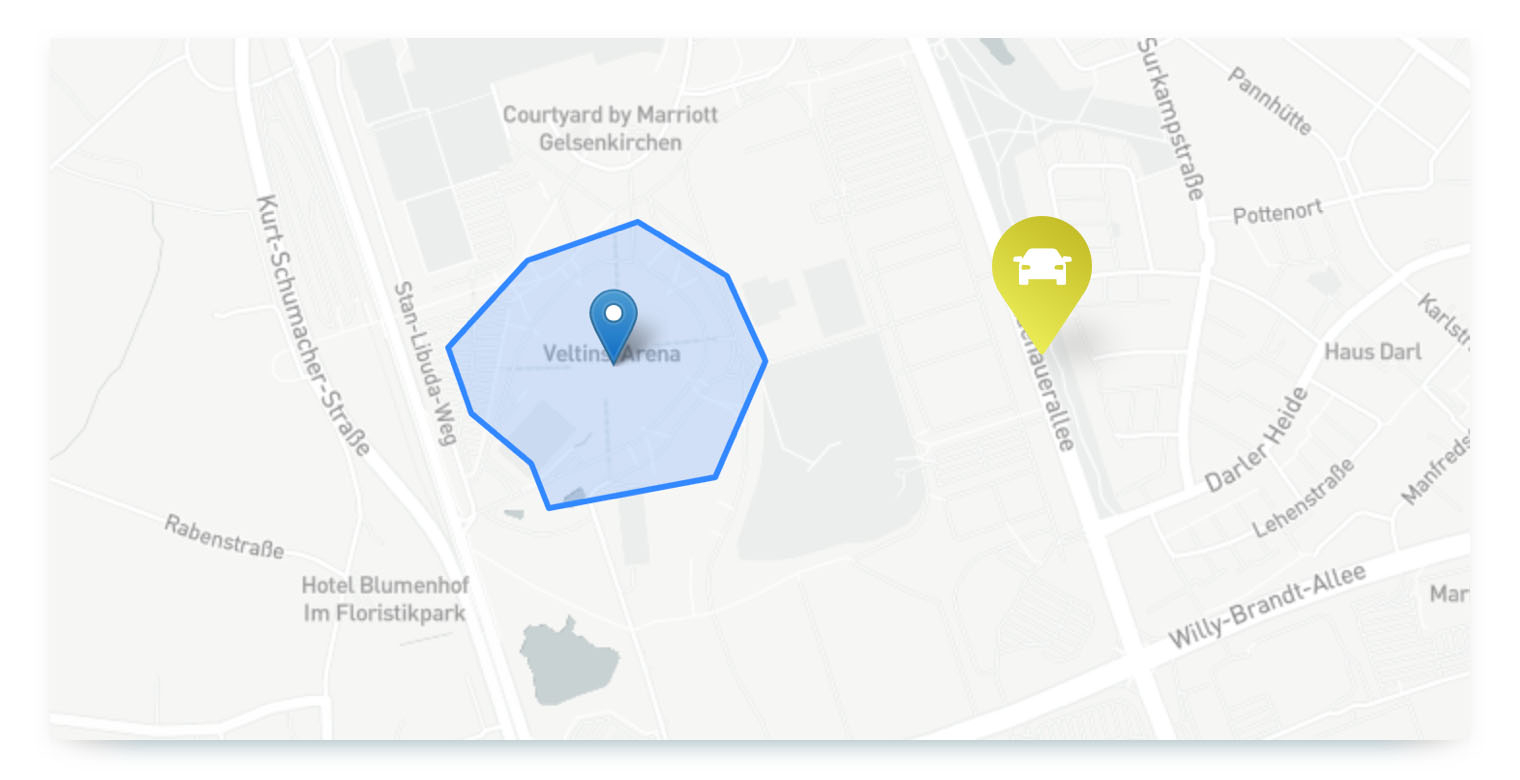
How Can Sharing Providers Decide Which Fees They Need?
While the preconfigured ones already cover the most important fees, the individual fees offer additional possibilities to set up rules.
So how do you decide which fees you need and which ones you don't?
If it is determined in the sharing operation that further offenses are being committed, the catalog can be continuously expanded. For example, if sharing providers notice that their vehicles are often left dirty, it is worthwhile to include this as a fee in the fee catalog.
Application: How Are Fees Imposed?
Sharing providers can find detailed descriptions and step-by-step instructions in the MOQO Academy.
How Are Fees Imposed?
Preconfigured fees are imposed automatically and generically, individual fees are imposed manually and on a case-by-case basis. This means whenever a vehicle is returned late, a fee is automatically imposed. However, if a fee is to be charged for a special cleaning, the sharing provider will search out the appropriate booking and then manually impose the fee for that booking. When sharing providers impose the fee, they can also upload and store photos in the portal - for example, a photo of the dirty vehicle. These serve as "evidence" and prove the legitimacy of the fee.
In the MOQO portal, sharing providers can also see the status of the fees they have imposed.
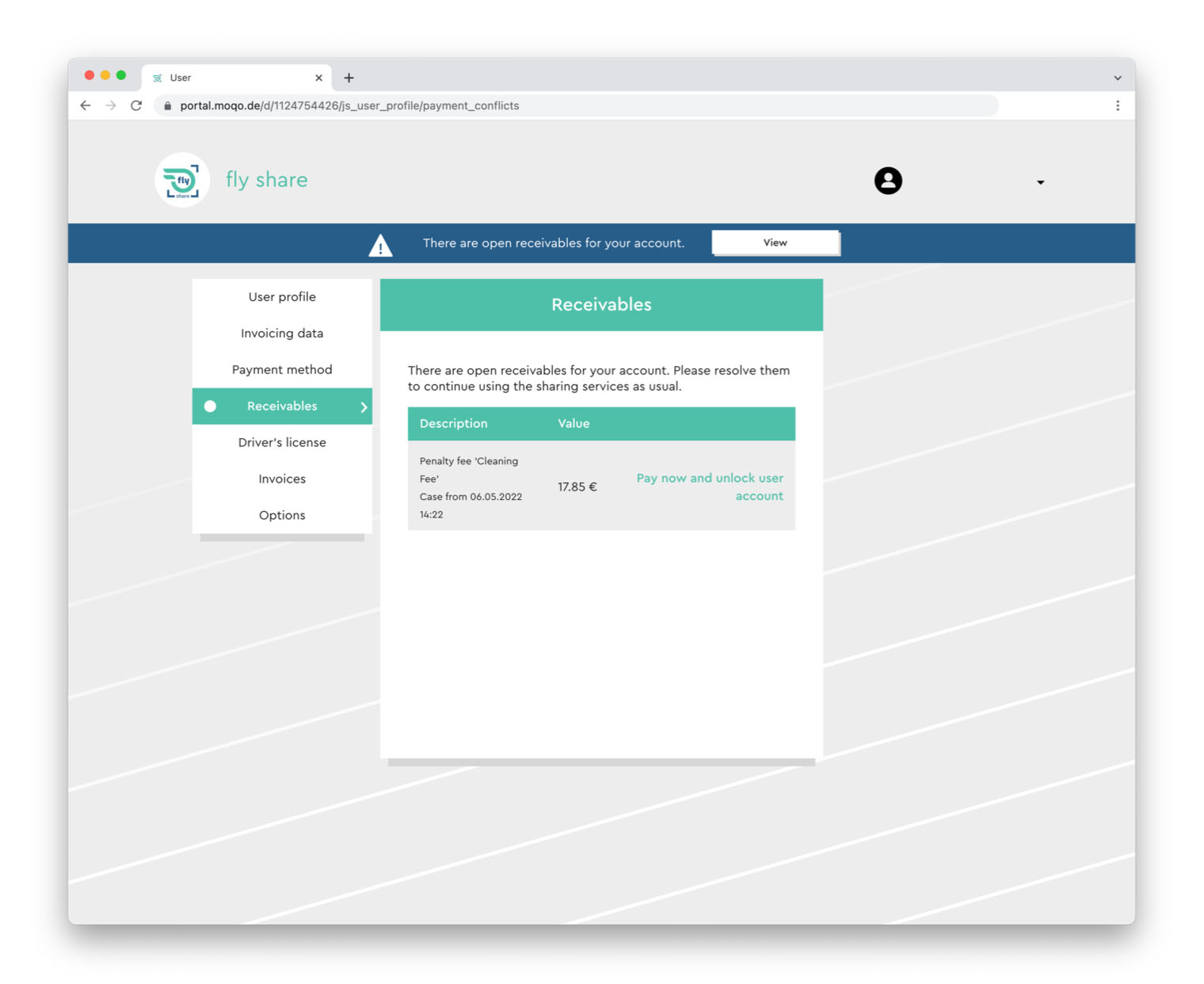
The Fee Catalog From the Driver's Perspective
Drivers can view the fee catalog before and during booking under "Terms of Use" in the app. The fee catalog is automatically accepted when the terms of use are confirmed.
"You Have Pending Payments"
It is always clearly recognizable for the driver if he has outstanding payments to settle: He receives an email informing him about the fee. Even when the app is opened, the open charges are clearly indicated. To ensure that the open payments are settled immediately, only the payment methods that debit the money immediately and make it available to the provider (e.g. Klarna Sofortüberweisung or credit card) are available.
What Happens If the Driver Does Not Pay the Fee?
By default, a payment deadline of 3 days is set in the MOQO portal. This deadline is customizable in the MOQO portal. If the defined deadline has passed and the driver has not paid the fee, the driver will not be able to make any further bookings and all the bookings already created in the future will also be cancelled until the outstanding debt is settled. This ensures that no further debt accumulates. Then the driver receives a series of reminders, which become more and more urgent. The 5th reminder is the last one and contains the notice that the outstanding payment will be handed over to a debt collection agency if the charges are still not paid. A collection procedure will be initiated independently by the sharing provider.

Fee Catalog at a Glance
All in all, the fee catalog offers security for all parties involved: for the sharing provider, for the booking driver and for other drivers. It shows transparently which rules exist and what happens in case of non-compliance with these rules. It can be flexibly managed and expanded in the MOQO portal and enables smooth sharing operations.




